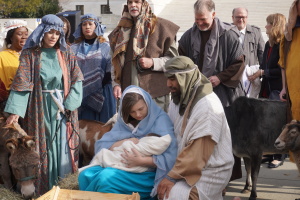Swiss Census 2000 Reveals Shift away from Religion Churches
Neuchbtel, Switzerland. The religious landscape in Switzerland has undergone a sea change, with a growing number of people moving away organised forms of religion.
According to the most recent census, 11.1 per cent of Swiss have no religious affiliation - a rise of ten per cent in just 30 years. At the same time both the Catholic and the Protestant churches lost members.
The results of the 2000 survey revealed that most people in this category were aged between 30 and 50, lived in cities and were more likely to be men than women.
The Federal Office of Statistics (FOS), which published the figures on January 30, said there was also a marked regional contrast, with French-speaking cantons claiming the greatest number of non-religious people.
Christianity remains the most-widely followed religion in Switzerland, with 41.8 per cent of the population defining themselves as Roman Catholics and 33 per cent as Protestants. However, both churches have registered a significant fall in the number of churchgoers since the last census in 1990 - down 363,000. The Orthodox churches have 130,000 followers. Jews accounted for just 0.2 per cent of the Swiss population.
The Federal Office of Statistics has also published detailed census figures of the Protestant Free Churches, including the Seventh-day Adventist Church. The 2000 survey revealed 2,809 Adventist Christians. However in the census period, the Swiss Union of Seventh-day Adventists had a registered adult baptized membership of 4,062. According to Christian B. Schaeffler, director for Communications and Inter- church relations of the German Swiss Conference, the difference between membership records and census figures is the result of a reserved position of individuals in regard to the declaration of their religious convictions in public surveys. "Swiss citizens are still discreet regarding their income, their statement of bank account, and their religious affiliation," said Schaeffler. "The majority of people talk about their own Religion in strict privacy," he added.
The 2000 census further displayed that the Free Churches, which are minority denominations, have a young age structure. On the other hand the quota of old aged members in the three national churches (Evangelical-Reformed, Roman-Catholic and Old Catholic) is steadily growing.
Schaeffler said: "The Census results should make us think whether the Church is close to people, close to their preoccupations, whether we and the way how we proclaim the gospel actually mean something to them."
Non-Christian religious groups account for some seven per cent of the population, a rise of just under four per cent since 1990. These religions include Islam, Hinduism and Buddhism. Muslims make up the largest non-Christian community, with 311,000 devotees. They include many Albanians from Kosovo and Macedonia. Hinduism and Buddhism each claim more than 20,000 devotees. The Federal Office of Statistics said factors such as immigration, mixed marriages and increased mobility had contributed to this development.
By Albert H. Lee
chtoday_editor@chtoday.com




























